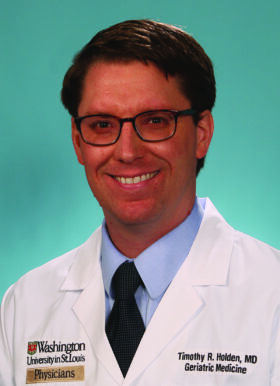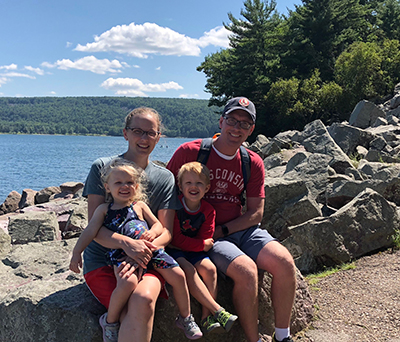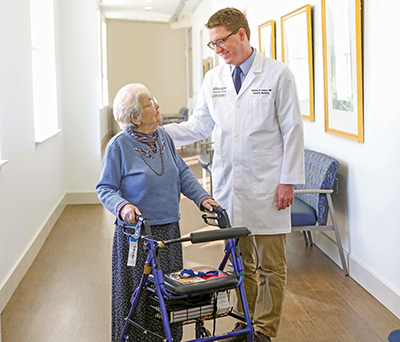Timothy Holden, MD

Timothy Holden, MD, is a geriatric primary care physician who specializes in older adult medical concerns, healthy aging and helping patients maintain functional independence.
Dr. Holden sees patients at:
- Washington University Geriatric Care, 8 Millstone Campus, Suite 1500, St. Louis, MO 63146
Please call 314-273-4374 for an appointment.
What happened in the course of schooling to influence you to choose your specialty?
Early in my training I was working with a seasoned geriatrician in clinic. Prior to a visit, I looked through the chart to familiarize myself with the patient. I very quickly became overwhelmed, and remember thinking, where do you even start with this patient who had a new diagnosis of dementia and is on 20+ medications? How do you address all of these issues in one office visit?
During the visit, the geriatrician started with a thorough social history, then segued into the priorities and care goals of the patient and family. At the very end of the conversation, the doctor used that information to dictate the patient’s care plan.
It was at that moment I thought, “That’s the sort of physician I want to be.” The specialty of geriatrics focuses on the goals and priorities of the patient – and that motivates my practice every day.
Would you consider geriatrics a new specialty?
It’s actually been around for a while, but has never quite taken off the way those of us in the field think it should have. It is coming into its own now as hospitals and managed care organizations are increasingly recognizing the importance of the holistic management for older adults across the continuum of care. Unfortunately there are just not enough geriatricians to meet the growing demand.
How does a person decide to make the switch to a geriatrician?
There are many different types of geriatric providers. A geriatric primary care physician provides the primary care of the patient, which is the majority of my practice.
There are also geriatric specialty clinics that see patients in a consultative role and help manage certain conditions, but the patient continues to see his or her primary care physician. Some geriatricians work in long term care or rehab facilities, while others work primarily in hospitals as either consultants or hospitalists. Other practices may even provide house calls.
Not every older adult needs a geriatrician, but there is great value in it. We are experts in medical conditions that are more prevalent in older adults such as memory loss, falls, and managing multiple medications and competing chronic conditions. But we are also experts in healthy aging and helping individuals maintain functional independence and quality of life.

What brought you to Washington University?
My wife, who is a surgeon, did her fellowship in minimally invasive surgery at Washington University. At the same time, I was fortunate enough to join the Charles F. And Joanne Knight Alzheimer Disease Research Center as a post-doctoral fellow. We were both thrilled to join the Washington University faculty in 2018. We both feel fortunate to be in such a collegial environment with great colleagues.
We have two young children and St. Louis is a very family friendly city. It was a happy accident that my wife did her fellowship here — we quickly fell in love with Washington University and everything St. Louis has to offer.
Which aspect of your practice is most interesting?
What I enjoy most about my daily practice is hearing people’s life stories. While stories are always interesting from a humanistic standpoint, they also provide insight into the way an individual thinks about his or her own health, and ultimately what is most important to him or her and gives their life value. Active listening works hand-in-hand with the practice of medicine, and I am always fascinated and humbled by the stories I hear every day.
Is there a patient who stands out as a success story?
One patient comes to mind. She was desperate when she came to me – she was having a hard time moving, she felt like she was losing her memory, was falling a lot, and really felt hopeless.
Over the course of several visits we very slowly chiseled away at a lot of little things that were adding up to cause really big problems. I heard she just passed her Illinois driving evaluation – that is remarkable.
In geriatrics there are no short cuts and no quick fixes, but if you chip away at the underlying contributing factors, you can sometimes make a big impact. That is why a long-term relationship is so important, because it is a journey. It doesn’t always end with the patient driving again, but you hope you can have a meaningful impact on their overall quality of life.
What new developments in your field are you most excited about?
What excites me most about geriatrics is that the curriculum is increasingly being integrated in medical school and resident education. I tell trainees that, with rare exceptions, they are going to be taking care of older adults. If they learn how to manage the inherent challenges of their older patients, it will also bring them a lot of rewards while also improving patient care.
More people are living well into their 80s and 90s, and beyond, is it because of better medical care?
I’m sure medical care has some role in it, especially with the amazing advancements being made in cancer care. But I think the improvements in quality of life and basic preventive health measures have had more of an effect on overall longevity. People are making healthier choices. They are more aware of the importance of staying physically active and taking better care of themselves. Reduced smoking rates have certainly helped.
Where are you from?
I am from Watertown, a small town in Wisconsin, between Milwaukee and Madison. My family still lives in the area.
Moving to St. Louis was a very comfortable transition and has a similar feel to my upbringing in Wisconsin.
What is a must-see in Wisconsin?
If you love the outdoors, I would recommend Door County, which is on the peninsula near Green Bay. If you catch the Fall colors it’s breathtaking. Otherwise, Wisconsin Dells claims to have the world’s largest water park – it is a bit more of a touristy spot but still lots of fun.
Which particular award or achievement is most gratifying?
When I was a resident in internal medicine at the University of Wisconsin, I received an award for best intern mentor. That meant the most to me because it was voted on by my peers. It recognized an aspect of medical training that might not be acknowledged as much as it should – the importance of peer mentorship.
What is the best ad

vice you’ve received?
I remember this well. It was during a lecture in medical school training when my professor said, “Always be curious.” I use this advice in my practice every single day:
Be curious about people and about their life story.
Be curious about that one little sign or symptom that doesn’t quite fit into the picture you’ve formed of what’s going on with a patient.
Be curious about a nugget of information the patient or patient’s family may have mentioned, because it might hint at something bigger. You can follow that nugget, ask them to tell you more and see where it leads you – which can often be surprising – or choose to ignore it to everyone’s detriment.
I’ve found that if I maintain that curiosity, I’m more satisfied with my daily practice and it makes me a better doctor.
If you weren’t a doctor, what would you like to be doing?
I would sell used books at my own rare and used book store. I love books — my favorite book is Ulysses by James Joyce. I have a very prized and heavily annotated copy I read in medical school.
What do you like to do for fun with your family?
Our kids are three and five years old — they keep us busy and basically dictate the day’s activities.
My wife and I love to play tennis. We also love music, both listening and playing it. We recently got a piano and plan to have the kids start piano lessons soon. We want to surround our kids with music because it has given us so much joy in our own lives.